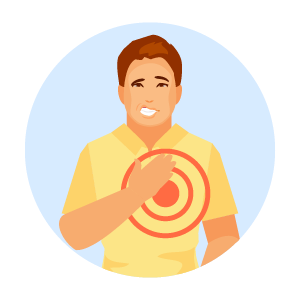
Get To Know Your Heart Doctors
Heart Attack
 Chest pain or discomfort |
 Upper back or neck pain |
 Indigestion |
 Heartburn |
 Nausea or vomiting |
 Extreme fatigue |
 Upper body |
 Dizziness |
 Shortness of breath |
Arrhythmia
 Palpitations or the heart beating too fast for a prolonged time period |
Heart Failure
 Shortness of breath |
 Fatigue |
 Swelling of the lower limbs, abdomen or neck veins. |
Other heart specialists may get involved in your heart care depending on the results of your health assessments, risk factors, preferences and other medical recommendations. Here are some of these specialists:
General Cardiologists
• Diagnose and treat conditions affecting the heart and blood vessels.
• Perform physical examinations and other tests to evaluate a patient’s heart health and function.
• Make recommendations on lifestyle changes, medications and procedures to improve your heart health.
Cardiac Imaging Specialists
• Use advanced imaging techniques to diagnose heart diseases.
Interventional Cardiologists
• Perform minimally invasive, catheter-based procedures to treat coronary artery, valve, peripheral and carotid artery diseases, especially for patients who cannot undergo traditional open-heart surgery due to their general health conditions.
Heart Valve Specialists
• Specialize in diagnosing and treating heart valve problems that may result in the heart having to pump harder to supply enough blood throughout the body.
Electrophysiologists
• Specialize in diagnosing unusual heart rhythms and electrical activity.
• Test cardiac electrical activity to diagnose the source of irregular heartbeats and help determine a suitable treatment.
Cardiac Rehabilitation Specialists
• Provide medically supervised, individualized education and exercise programs to improve a patient’s cardiovascular health.
• If needed, they work with social workers or psychiatrists to provide emotional support to patients.
Cardiothoracic Surgeons
• Specialize in surgical procedures on the lungs, heart, esophagus and other organs found from the collarbone to the diaphragm.
Here are the types of cardiothoracic surgeons, along with the cardiothoracic conditions they treat:
| Cardiac or cardiovascular surgeons: | General thoracic surgeons: | Congenital heart surgeons: |
|
|
|
|
|
|
|
|
|
|
|
|
|
|
|
|
|
|
Sources:
American Heart Association
Centers for Disease Control and Prevention


